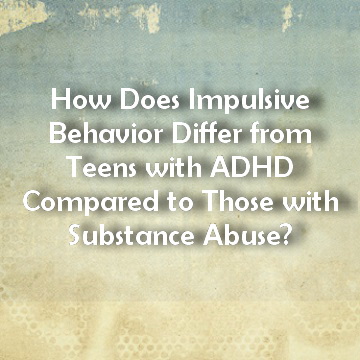How Does Impulsive Behavior Differ from Teens with ADHD Compared to Those with Substance Abuse?
Impulsive behavior, known more formally as impulsivity, is behavior that occurs spontaneously or with only minimal forethought or preparation. For a number of reasons, teenagers generally act impulsively more frequently than adults. Impulsivity in teens with attention-deficit hyperactivity disorder (ADHD) has been linked to increased risks for involvement in alcohol, drug and cigarette use. However, according to the results of a study published in 2012 in the journal Nature Neuroscience, the roots of the impulsive behavior found in teens with ADHD differ significantly from the roots of the impulsive behavior associated with teen substance use.
Teen Impulsivity Basics
The human brain relies on a specific region, called the frontal cortex, to perform and regulate such higher-level tasks as making judgments or decisions, gaining perspective on self-motivation and controlling fleeting or momentary urges. However, during adolescence, the frontal cortex is not completely formed. This lack of brain development goes a long way toward explaining why teenagers tend to act impulsively, even when they receive information from adults that’s designed to offset impulsivity. The authors of another study, published in 2009 in the American Psychological Association’s American Psychologist, concluded that teens age 16 and older actually have enough brain development to reason in a manner similar to adults. However, teens in this age group still generally lack the emotional maturity to adequately or consistently control their impulsive behaviors.
the frontal cortex is not completely formed. This lack of brain development goes a long way toward explaining why teenagers tend to act impulsively, even when they receive information from adults that’s designed to offset impulsivity. The authors of another study, published in 2009 in the American Psychological Association’s American Psychologist, concluded that teens age 16 and older actually have enough brain development to reason in a manner similar to adults. However, teens in this age group still generally lack the emotional maturity to adequately or consistently control their impulsive behaviors.
Impulsivity and ADHD
Along with hyperactivity, impulsivity forms one of the two basic symptoms of ADHD. Impulsive urges in a teenager (or younger child or adult) affected by the disorder may manifest as a generally high level of impatience, a tendency to frequently interrupt others, an inability to wait patiently in different situations, a general lack of emotional restraint, a tendency to disregard unpleasant outcomes of one’s actions, or an inability to tailor one’s words appropriately for a given social situation. Some teens with ADHD have prominent symptoms of impulsivity and hyperactivity, while others have little or no problems with hyperactivity/impulsivity and instead have significant problems maintaining focus or attention.
Connections to Substance Use
In the past, researchers have clearly linked the presence of ADHD to increased risks for substance use in teenage populations. In the study, published in Nature Neuroscience, a multinational research team explored this link by periodically examining the brain function of 1,896 adolescents. These teens were all age 14 when the study began, and underwent brain scans at two-year intervals over the next four years. During these scans, all participants were asked to perform tasks that measured their level of self-control. The researchers also used medical histories to determine how many of the study’s participants had symptoms of ADHD. In addition, they periodically asked the participants about their level of involvement with alcohol, drug and cigarette use.
After reviewing their findings, the authors of the study concluded that the presence of ADHD itself does not reduce teenagers’ ability to control their impulsive urges. Similarly, they concluded that teens who use substances also don’t generally have a reduced ability to control their impulses. This does not mean that teens who have ADHD or use substances don’t act impulsively; it simply means that teens with these issues apparently don’t typically act impulsively any more often than teens unaffected by these issues. Critically, the authors of the study also concluded that when teens with ADHD do act impulsively, their behaviors are triggered by different brain pathways than the pathways that trigger impulsive participation in substance use. This finding suggests that the presence of ADHD-related impulsivity is not as likely to contribute to substance use risks as scientists once commonly believed.
Considerations
Interestingly, the authors of the study in Nature Neuroscience also concluded that the brain pathways that contribute to impulsivity-related substance use kick into gear even when some teenagers use only minimal amounts of a given substance. This finding strongly suggests that substance use itself does not lead to increased impulsivity in adolescents. Instead, the reverse is likely true, with the preexisting effects of impulsivity contributing to increased participation in substance use. In real-world terms, this means that some teenagers may have longstanding or built-in impulsive tendencies that make them much more susceptible to substance use (and subsequent problems with substance abuse or addiction) than other teenagers who come from similar backgrounds, belong to similar peer groups and participate in similar sorts of daily activities.
“The take-home message is that impulsivity can be decomposed, broken down into different brain regions,” says Hugh Garavan, one of the study authors. “The functioning of one region is related to ADHD symptoms, while the functioning of other regions is related to drug use.”



